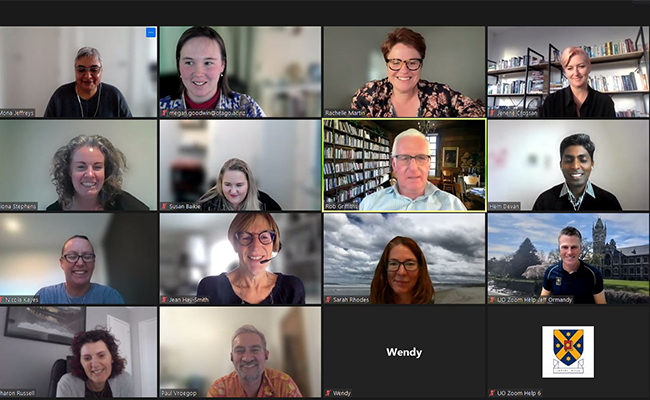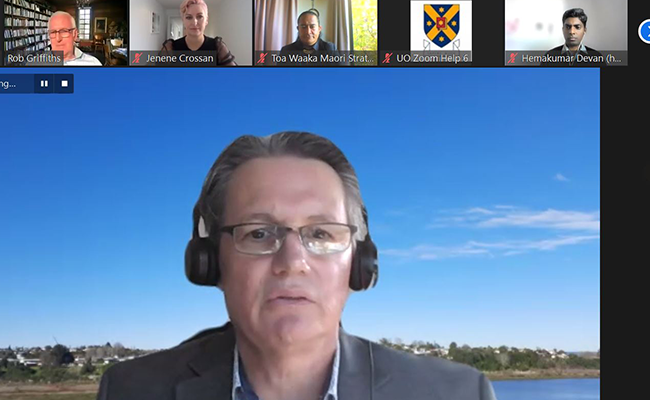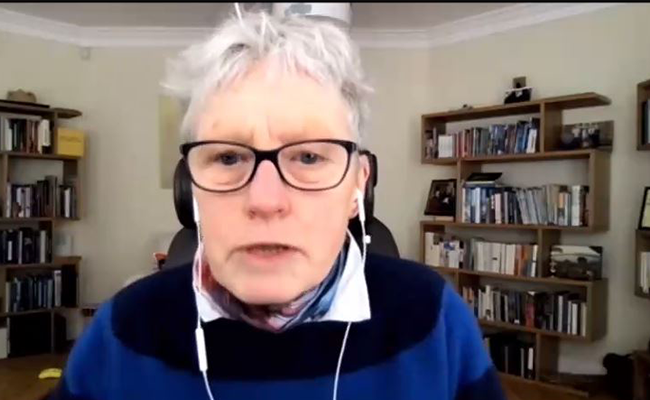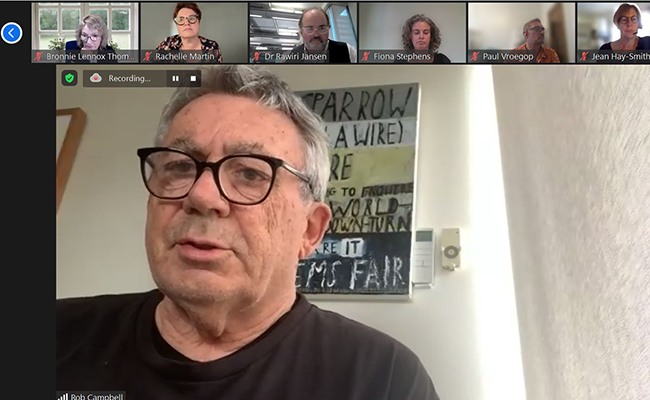 Participants at the post-Symposium debrief
Participants at the post-Symposium debrief
More than 2,300 people tuned into a day-long online symposium on Long COVID hosted by the University of Otago, Wellington.
The symposium, Long COVID: Journeying together through the fog, was organised as a way of sharing the latest information on supporting those who experience ongoing symptoms following a COVID-19 infection, including those with Post-Acute COVID-19 Syndrome (PACS) or Long COVID.
Convenor Dr Rob Griffiths says while New Zealand's high vaccination rates will reduce the number of people who get severe disease and Long COVID, the sheer numbers of people infected in the pandemic mean as many as 200,000 New Zealanders could continue to experience symptoms more than three months after being infected with COVID-19.
“This symposium was an important step in drawing more attention to this very important novel condition. I hope it will have inspired health and disability professionals to take more of an interest in learning more about Long COVID, and that some may even go on to set up specialist outpatient services. It will also have given the Ministry of Health, and other health funders a clearer idea of the need for future services.”
 Dr Martin Chadwick, Chief Allied Health Professions Officer at the Ministry of Health, talks to attendees.
Dr Martin Chadwick, Chief Allied Health Professions Officer at the Ministry of Health, talks to attendees.
The symposium, on on 25 May, was organised by Te Whare Whakamātūtū, the Rehabilitation Teaching and Research Unit (RTRU) in the Department of Medicine on the Wellington campus, in collaboration with Te Herenga Waka—Victoria University of Wellington and the Auckland University of Technology (AUT) Centre for Person Centred Research.
It opened with a heartfelt presentation from advocate Jenene Crossan, who talked about having Long COVID and the experiences she had with the health system and health providers. This was followed by presentations from top national and international experts from a wide range of health disciplines including physiotherapy, primary health care, psychology and occupational therapy.
The event opened with a karakia and mihi whakatau and closed with a poroporoaki karakia from Toa Waaka, the Rautaki Hononga Māori (Māori Strategic Framework Project Manager) on the Wellington campus.
The speakers included:
• Dr Martin Chadwick, physiotherapist and Chief Allied Health Professions Officer at the Ministry of Health
• Disability Rights Commissioner Paula Tesoriero
• Professor Nicola Kayes, Director of the Centre for Person Centred Research and Professor of Rehabilitation in the AUT School of Clinical Sciences
• Professor Michael Baker, epidemiologist and public health physician from the University of Otago, Wellington
• Dr Paul Skirrow, clinical psychologist and Senior Lecturer in the Department of Psychological Medicine at the University of Otago, Wellington
• Drs Lynne Russell, Marianna Churchward and Mona Jeffreys, leaders of the major Te Herenga Waka—Victoria University of Wellington study on the impact of COVID 19 in Aotearoa
• Associate Professor Eileen McKinlay, Director of the Centre for Interprofessional Education, at the University of Otago
• Dr Rachelle Martin, RTRU Lecturer and Research and Knowledge Translation Lead at the Burwood Academy Trust, in Christchurch
• Researcher and indigenous and human rights advocate Tina Ngata.
The event concluded with responses from Dr Rawiri Jansen, co-leader of the Māori pandemic response group Te Rōpū Whakakaupapa Urutā, and Rob Campbell, the Chair of Health NZ.
 Professor Trisha Greenhalgh from the University of Oxford presents at the symposium.
Professor Trisha Greenhalgh from the University of Oxford presents at the symposium.
Dr Griffiths says those who attended the event included clinicians, health system planners, members of the general public and people with Long COVID. They included around 70 international attendees, from countries including China, Fiji, Solomon Islands, the UK, USA, and Brazil.
The event was organised by the PACS-Long COVID steering group, which comprised Convenor Dr Griffiths, who has qualifications in public health and occupational medicine; Dr Hemakumar Devan, a Lecturer at the RTRU and a pain management physiotherapist at the Wellington Regional Pain Service; Dr Rachelle Martin, RTRU Lecturer and Research and Knowledge Translation Lead at the Burwood Academy Trust, in Christchurch; Dr Mona Jeffreys,
Senior Research Fellow at the Health Services Research Centre; and Professor Nicola Kayes, Director of the Centre for Person Centred Research at AUT.
 Rob Campbell, the Chair of Health NZ, at the symposium.
Rob Campbell, the Chair of Health NZ, at the symposium.
Recordings of the symposium talks will be available here